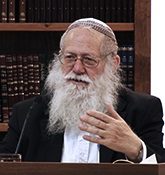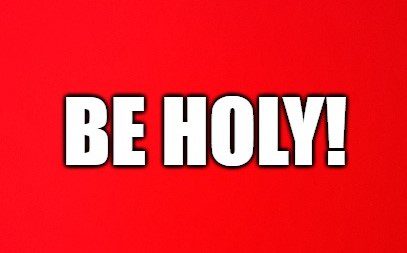Messages for Today
by HaRav Dov Begon, Head of Yeshivat Machon Meir

“You shall be holy!”
The phrase “You shall be holy” (Leviticus 19:2) has two meanings. The first is a commandment to be holy, that is, we are commanded to separate ourselves from sexual immodesty and from other sins (Rashi, Ibid.). In the second meaning, the Torah is stating a necessary reality (Sichot HaRav Tzvi Yehuda HaKohen Kook, zatzal, Acharei Mot-Kedoshim). G-d is promising us that we are a holy nation whose purpose it is to be a light unto the nations, as was said to Abraham, “All the nations of the earth shall be blessed through you” (Genesis 12:3).
Indeed, we must learn and remember and recognize the fact that we are a holy people, a special people, a unique creation in the universe. “I have created this people for Myself that they might tell My praise” (Isaiah 43:21); “Blessed be the L-rd… who has chosen us from among the nations and given us His Torah” (morning Torah blessings).
Today, in this generation, the most important issue that we have to learn and recognize is our uniqueness as a nation whose whole purpose is to bring light to humanity.
“When we reject our superiority and cease to recognize our chosenness, our greatness and excellence which surpass that of all other nations, this constitutes a fundamental error. If we forget our greatness, we are forgetting our essence…. Only when we forget our essence do we remain insignificant and inferior. By forgetting that essence, we forget our greatness” (Rabbi Abraham Isaac Kook, Orot HaTechiyah, 5, page 55).
Our national and political weakness are the result of this forgetfulness, lack of knowledge and lack of recognition of what we are and what our lives signify. We must educate ourselves and others to recognize the identity and unique essence of the Jewish People, chosen from among all nations to bring goodness to the world. We must realize that it is for this that we have been fighting throughout all of history, especially during the last hundred years, including the present war, which is a war between the people of light and the people of darkness.
The knowledge and belief that we are holy and that we possess a special soul that is revealed precisely in Eretz Yisrael — and it is for this revelation that we are fighting — will give us the strength and valor to emerge victorious in all the battles confronting us.
“A redeemer shall come to Zion and those in Jacob who turn from transgression.”
Many sins require rectification, but none more than theft and sexual sin, for a person “craves” these two sins (Makot 23b). They not only can destroy the private individual and his family, but they can also harm the entire nation, as occurred during Joshua’s time. When Achan benefited from the taboo booty at Jericho, we then lost in the first battle against Ai, and the result was, “The hearts of the people melted, and became as water” (Joshua 7:5).
As far as sexual sin it says, “The people who lived in the land before you did all these disgusting perversions and defiled the land. Do not cause the land to vomit you out when you defile it, as it vomited out the nation that was there before you” (Leviticus 18:27-28). Rectifying these sins rests on the educational and legal system, as it says, “Keep My charge, and do not follow any of the perverted customs that were kept before you arrived, so that you not be defiled by them” (ibid., 18:30).
Today, it is true that we are meriting to see with our own eyes the fulfillment of the Prophet Amos’s prophecy: “I will return the captivity of My people Israel, and they shall build the waste cities, and inhabit them. They shall plant vineyards, and drink the wine thereof. They shall also make gardens, and eat the fruit of them. I will plant them upon their land, and they shall no more be plucked up out of their land which I have given them – the word of the L-rd, Your G-d” (Amos 9:14-15).
Yet at the same time an obligation and a duty rests on us to purify and rectify what has been corrupted, especially regarding theft and sexual sin. Those who commit these sins destroy themselves and their families and harm the entire nation. The way to rectify our deeds and character is to return to our holy Torah. As Rabbi Avraham Yitzchak Kook, zt”l, wrote:
“Moral blemishes finding their root in people straying from innate morality become total when people turn away from divine morality by withdrawing from religion. Abandoning and rebelling against G-d’s mitzvot constitutes terrible moral decline. This only occurs in a person when he starts to wallow in coarse materialism.
“There is the possibility that for some period of time a generation, all or some of it, will become so entangled in such moral blindness that they cannot at all discern the moral decline inherent in abandoning G-d’s laws… Yet repentance always has to come and to be revealed, for the disease of forgetting G-d’s world cannot take up a solid place in man’s nature. Man’s nature is like a muddied stream, which eventually becomes clear once more.” (Orot HaTeshuvah 6:4).
The day is not far off when we will be privileged to see with our own eyes the great repentance that will encompass the entire nation. The result will be that “a redeemer shall come to Zion and those in Jacob who turn from transgression” (Isaiah 59:20).
Love Your Neighbor as Yourself – Generalities and Specifics
“‘Love your neighbor as yourself’ (Leviticus 9:18) – Rabbi Akiva commented, ‘This is a major principle of the Torah.’”
Our sages, in setting out to delineate this mitzvah, bring the story of the non-Jew who, wishing to convert, approached Hillel the Elder to have him teach him the entire Torah on one foot. Said Hillel, “That which is despicable to you, do not do to your fellow man. That is the entire Torah. Go learn the rest” (Shabbat 31a).
As Rashi explains, all the mitzvoth mentioned in the Torah are included in this. Moreover, Rabbi Moshe Chaim Luzzatto in his Mesillat Yesharim says of the saintly person who loves G-d, and whose entire interest is to bring contentment to his Maker, that he can accomplish this “by always doing good to one’s fellow men and not doing them harm, physically, monetarily or psychologically. Physically this means always striving to help them however one can, and to lighten their burdens… Monetarily it means helping out one’s fellow man as much as one can afford, and saving him from harm. Psychologically it means striving to bring him as much contentment as possible. This includes doing whatever one can to see that one’s friend receives respect, and certainly includes not distressing him in any way, and it also includes seeking to encourage harmony between people.” (Mesillat Yesharim, Chapter 19).
Indeed, Hillel’s advise to “love your neighbor as yourself” was not just a private matter. It did not just concern that particular convert’s receiving instruction from Hillel that the entire goal of the Torah and of Jewishness is to make one a good person. Rather, the idea of goodness in the world, as revealed in the human being as an individual, is also a matter for the Jewish People in the aggregate. What distinguishes our people down through the generations, what sanctifies G-d’s name in the world, is our being a great and holy nation with a unique soul, as Rav Kook taught:
“The essence of being benevolent to all, without any earthly limit, whether in the quantity of those benefiting or in the quality of the benevolence, constitutes the inner kernel of the soul of the Jewish People. This is Israel’s inheritance, and their ancestral legacy.” (Orot 139)
The further along we march on the upward path towards national rebirth, the more we will uncover the soul and the light of Israel. All mankind will then recognize and appreciate and respect the Jewish People, whose entire raison d’etre is to spread G-d’s light through the world, as torchbearers of the father of our people Abraham, who proclaimed G-d’s name in the world – a proclamation that continues on forever.
Looking forward to complete salvation.






